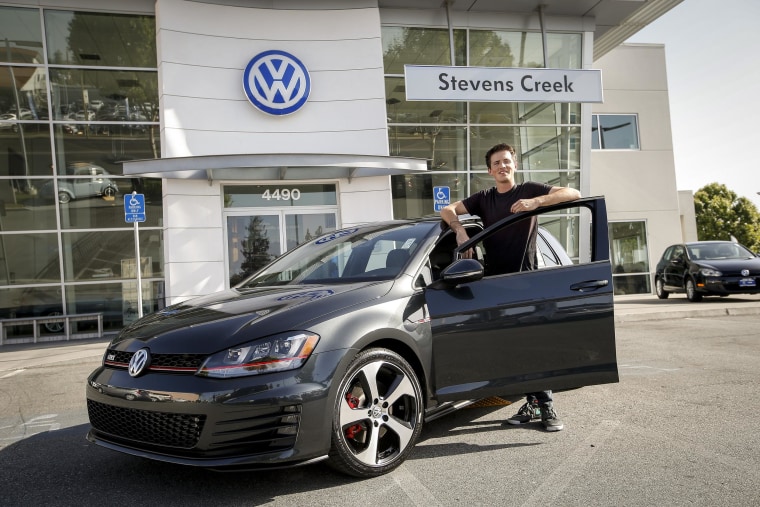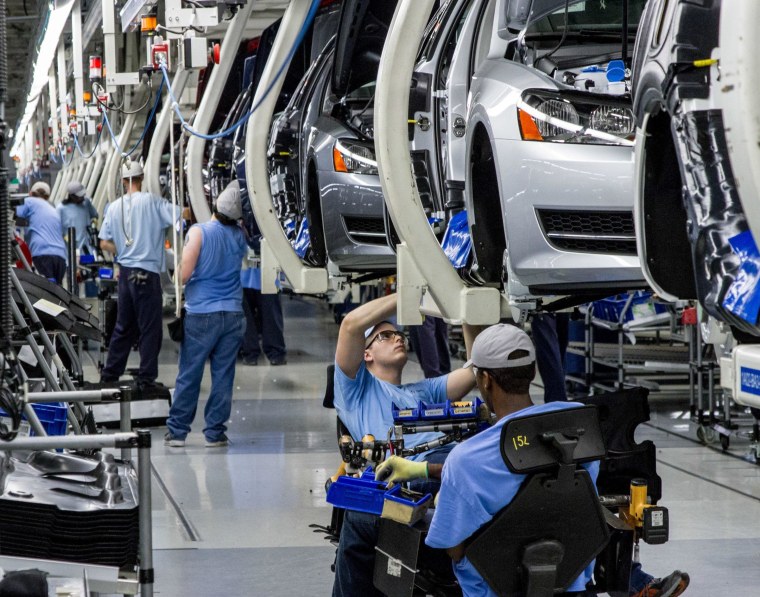(CORRECTION: This version corrects the affiliation of Stephanie Brinley, who is an analyst for IHS Automotive, not AutoPacific.)
Better late than never, or so hopes Volkswagen.
Most automakers have been posting double-digit gains in recent months as vehicle sales have surged to their highest level since the start of the Great Recession. But VW’s double-digit numbers have been in the negative column: the German maker was down more than 15 percent in May, continuing a disturbing, two-year plunge.
It wasn’t supposed to happen this way. Earlier in the decade, VW was leading the automotive recovery, posting some of its best sales since the era of the original Beetle, and laying out ambitious plans to sell at least 800,000 vehicles a year in the U.S. by 2018. Then the bottom fell out.
Why is a matter of debate. It certainly doesn’t help that it is only now launching the new U.S. version of one of its most important products, the compact Golf, which has been on sale in Europe for more than a year. Whatever the reason, meeting the 800,000 target by 2018 now seems out of the question, acknowledges Michael Horn, the 25-year Volkswagen veteran who recently took over U.S. operations.
“For now, we have to have realistic targets,” Horn said during an interview in San Francisco coinciding with VW’s launch of the all-new, seventh-generation Golf hatchback. Horn stressed that “the vision is right … long-term. But timing is the huge challenge.”

Horn made clear he was not ready to issue a formal statement revising the bold plan first outlined by former Volkswagen Group of America CEO Stefan Jacoby in 2008. But with the target date fast approaching and VW only halfway to its sales goal, there seems little doubt the maker will have to issue a public revision, he confirmed.
“It’s only a few years away,” with virtually no chance of making it, agreed Stephanie Brinley, a senior analyst with IHS Automotive, who described the original sales target as “hubris.”
‘Build the cars people want’
In the heyday of the original Beetle, Volkswagen was the biggest import nameplate in the American market. But as the Bug aged and the twin oil shocks of the 1970s got American motorists focused on fuel economy, the maker began losing ground to Japanese competitors like Toyota, Honda and Nissan. Quality problems made the situation worse. And after closing its original U.S. assembly plant in Westmoreland, Pennsylvania, three decades ago, industry analysts suggested VW was losing interest in the American market.
By the early 1990s, annual sales bottomed out at around 54,000, and VW gave serious thought to abandoning the American market, following such European brands as Renault, Peugeot and Fiat. VW ultimately chose to stick it out but sales rebounded only gradually and have, ever since, been on a roller-coaster ride.
Under Jacoby, demand began to improve, giving VW hope it could become a serious player in the U.S. again. From barely 200,000 vehicles a year, sales hit the 400,000 mark three years ago, reaching a level Volkswagen hadn’t seen since the original Beetle was at its peak.
Credit went to not just some updated products, but to models specifically tuned to the American market. The 2011 launch of on all-new Passat seemed poised to give the maker critical momentum, especially as it launched production of the big sedan at a new assembly plant in Chattanooga, Tennessee, VW’s first factory in the U.S. since the Westmoreland facility was shuttered.
But there were major gaps in the lineup, Horn acknowledged. In particular, the maker needed to target both the midsize and compact SUV segments – two of the largest niches in the American market. But plans have repeatedly been delayed, despite expectations the production plans for the midsize CrossBlue utility vehicle would be revealed in 2013.
Horn hints that the details should be announced shortly, and production is expected to be handled by the Chattanooga plant — which would undergo a significant expansion to handle CrossBlue and possibly other future models, such as a second SUV based on a stretched version of the current Tiguan.
The delay in launching those new utility vehicles, and the fact that the American Golf debut lags a year behind Europe, surprises some observers. Without a full product portfolio, said analyst Brinley, there’s been little way for VW to maintain its growth pace.
So, why set an admittedly aggressive plan only to short-circuit it by delaying new product? Horn stressed that VW wanted to ensure the production version of its well-received CrossBlue Concept was properly tailored to the market.
“We’ll succeed only if we build the cars people want here,” he emphasized.
But several well-placed VW sources suggested that was only part of the problem. The maker has been ambitiously pushing to grow in other markets, including China, now the world’s largest automotive market.
“China took precedence,” said one insider, noting that cash originally targeted at the U.S. was diverted — effectively. VW last year nudged past arch-rival General Motors to become the largest automaker in China. It also passed GM in global sales and is now chasing Toyota, which it hopes to leapfrog before decade’s end.
But VW officials know that to firmly take worldwide sales leadership they cannot ignore the U.S. market. So, expect to see them shift resources back to the States over the next several years. The 2018 goal may get pushed back, but it won’t be abandoned, Horn underscores.
More from The Detroit Bureau:
Americans Want Roads Fixed and Are Willing to Pay
Toyota Recalls Cars a Second Time to Fix Airbags
